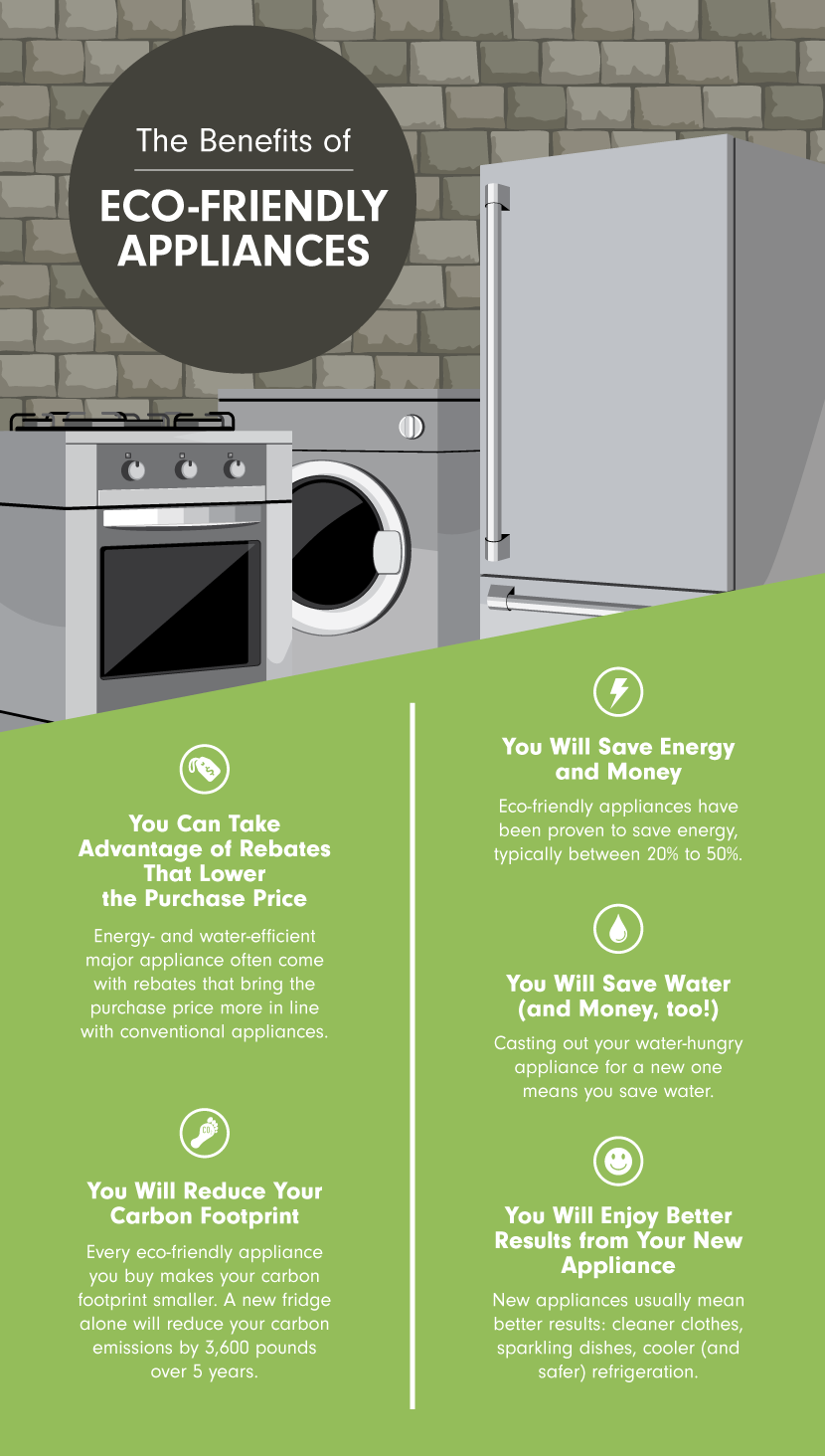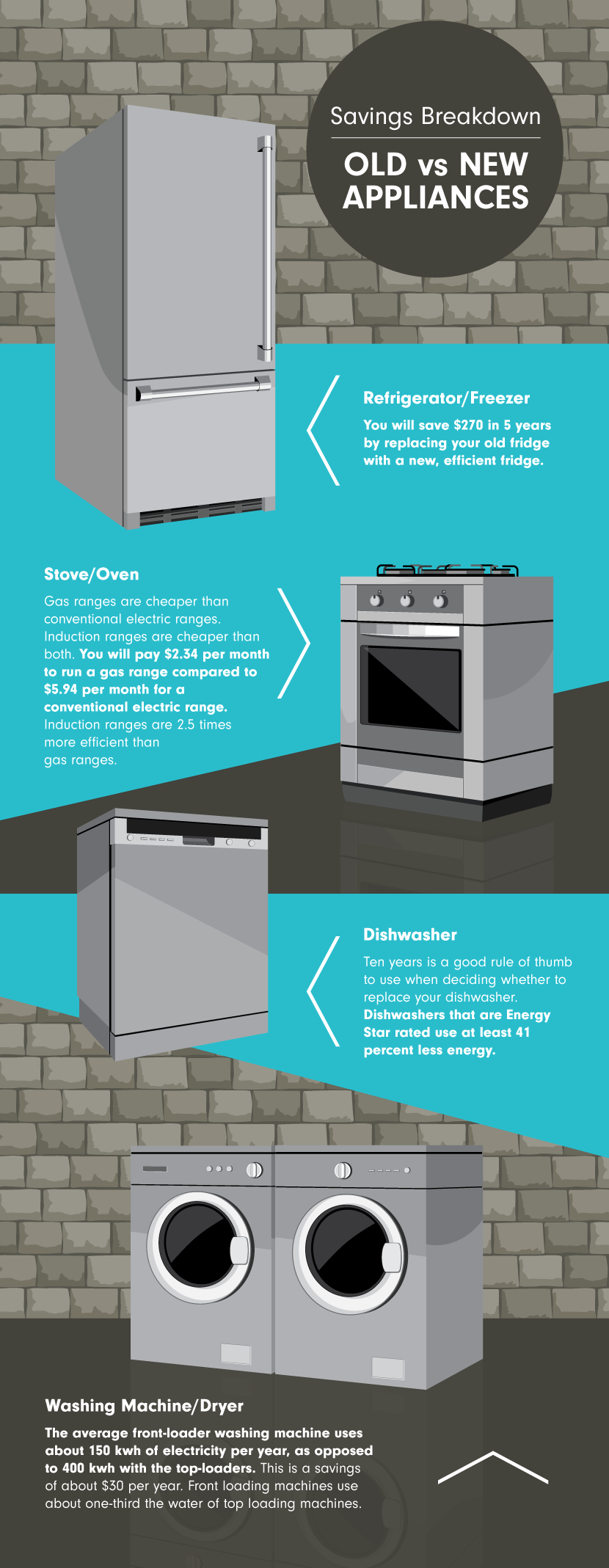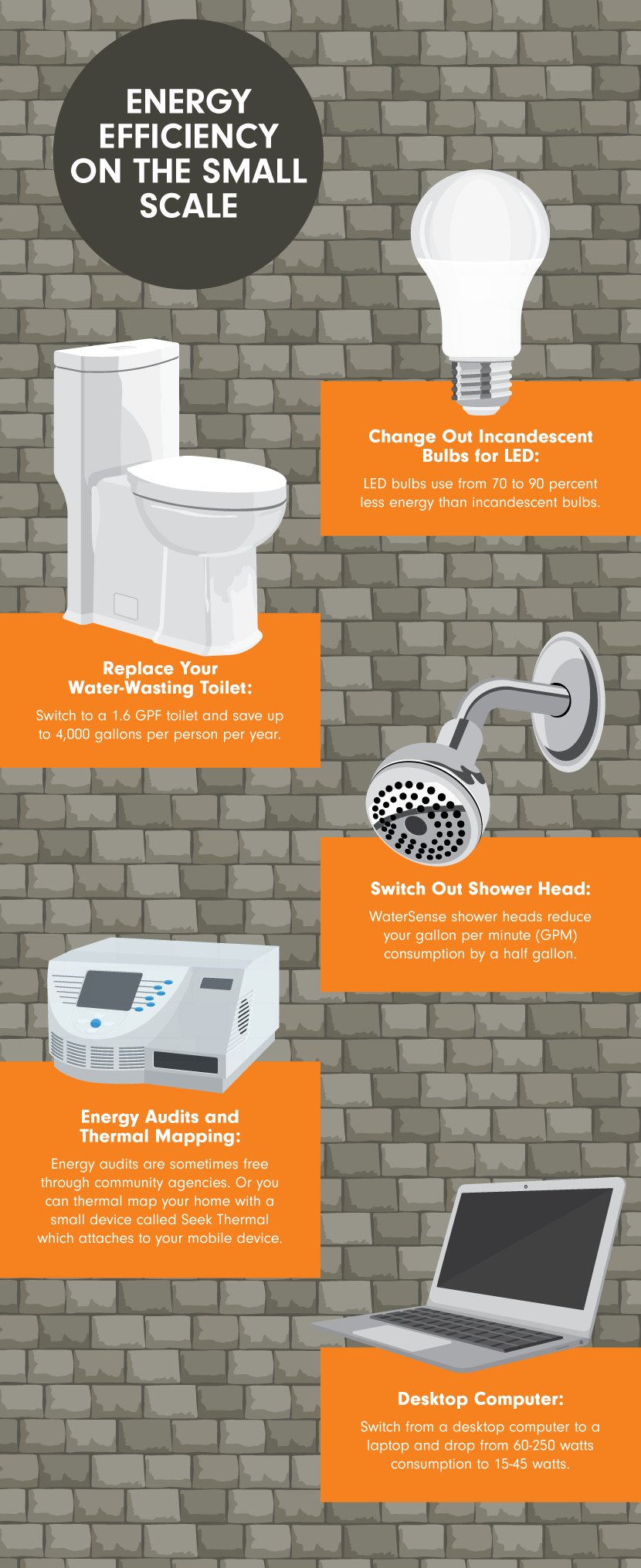The Environmental Impact of Using Energy-Efficient Major Appliances
Few of us ever imagine purchasing a major appliance when the current one is still running. But when you consider how your
present refrigerator, dishwasher, or washing machine is impacting your life and the world in general, you may begin to have a
different opinion.
Think of your current appliance as that toxic friend or partner who is dragging down your life in ways that you sense
subconsciously but cannot quite define. When you re-frame the purchase of a new and more efficient appliance, not as an
indulgence or a luxury, but as a highly practical solution to an urgent matter, everything seems to fall in place and make more
sense.http://appliances.sustainablesources.com
Benefits of Investing in a New, Eco-Friendly Appliance
It may look innocent, but that old dishwasher, refrigerator, or other major appliance just might be your worst enemy. On the
surface, it more or less does its job. You push the button, and in return the clothes washer delivers clean clothes, the
dishwasher gives you clean dishes, and the fridge keeps the food cold. This human-to-machine contract has been fulfilled?
Maybe not.
What you do not see are the wasteful internal operations that sap electricity and water, both of which you pay dearly for at
the end of the month when the bill arrives. And that part about clean clothes or clean dishes or cold food: did the machine
really do its absolute best? Again, maybe not.https://www.houzz.com/ideabooks/2219946/list/how-to-choose-and-use-ecofriendly-kitchen-appliances
After that initial cost to purchase the new, eco-friendly appliance, everything that follows is a benefit.
Personal Energy Savings
All smart eco-friendly major appliances use less energy than their not-so-smart ancestors; that is one cornerstone of
eco-friendliness. Newer technology in these machines will help slow your electric meter to a crawl. Also, simply by virtue of
updating parts like door seals, fans, and compressors, the new machine will work smarter, not harder.http://www.sunset.com/home/natural-home/eco-friendly-home-appliances
Water Savings
Saving water is the other cornerstone when it comes to efficient dishwashers and clothes washers. Manufacturers of both
types of machines help you reduce water consumption by introducing smarter technology that produces the same results with less
water usage. As one example, it is estimated that an Energy Star clothes washer can save you 3,000 gallons of water per year
and still produce clothes that are as clean and even cleaner than before.
Reduces Carbon Footprint
Your impact on the environment is greatly reduced by purchasing major appliances that are efficient with water and energy.
It is estimated that over a five-year period, you can reduce your carbon footprint by 3,600 pounds by purchasing an Energy
Star-rated refrigerator. When you recycle your fridge, too, you keep refrigerant and insulating foam out of landfills.
Rebates That Lower the Purchase Price
It is common for local utilities to offer rebate opportunities for those purchasing a certified machine. Clothes dryers,
washers, dishwashers, refrigerators, and even light fixtures are examples of items that may come with offers for
post-purchase rebates.
Better Results
In addition to those savings, you will most likely get better results from your major appliance by upgrading it. For
example, newer clothes washers can spin your wet clothing faster and harder, resulting in less water for your dryer to dry
out.

Savings Breakdown of New vs. Old Appliances
Refrigerator/Freezer
Old vs. new: how can you argue the point when you learn that, on average, older fridges suck up twice as much energy –
and twice as much of your paycheck – than do Energy Star-rated fridges?
You can expect to save about $270 in the next five years simply by replacing your old fridge with a new, efficient fridge.
Likely, your old refrigerator is low on refrigerant; is poorly insulated; and its door seals are not adequately keeping
in the cold.
Tip: Choosing a smaller refrigerator and packing it full is actually less energy efficient than purchasing a larger
fridge, because the compressor has to work harder to cool the packed fridge. Also consider buying a fridge that does not have
an ice maker, as this is another energy vampire.https://www.energystar.gov/products/appliances/refrigerators
Stove/Oven
The eco-friendliest thing you can do with stoves and ovens is to dump your conventional electric range. When you decide to
change from an electric stove and/or oven, you automatically cut your energy consumption by two-thirds.
Expect to pay about $2.34 per month to run a gas range without a pilot light, when the gas rate is $1 per therm. Running
an electric range will cost $5.94 per month.
Even more efficient than gas, though, are induction ranges (which are electrically powered). In terms of cooking
efficiency, induction is considered to be 2.5 times more efficient than gas.http://home.howstuffworks.com/gas-vs-electric-stoves2.htmhttps://www.treehugger.com/kitchen-design/which-more-energy-efficient-cooking-gas-or-induction.html
Washing Machine/Dryer
Horizontal axis machines (front-loading) are more water- and electricity-efficient than vertical axis (top-loading)
machines. The average front-loader uses about 150 kwh of electricity per year, as opposed to 400 kwh with the top-loaders.
This is a saving of about $30 per year.
But the real savings is in water consumption. Top-loaders are water hogs, gobbling up two-thirds more water than
front-loaders. Because water costs money for most homeowners, buying the efficient front-loader translates to money savings.
While front-loading washers are more efficient, if you like top-loading machines you can still save water and energy with
the newer top-loaders. They have technology that allows you to fill the basin to a lower level and still get the same,
or better, results.
Tip: Even though you now have the fancy, energy smart dryer, you will get maximum savings by line-drying your clothes
when the weather is warm and dry. Some homeowners who have large laundry rooms even run lines inside, allowing them to
line-dry in damp or cool months.http://www.foxnews.com/real-estate/2011/02/16/do-front-load-washers-save-money-or-just-water.htmlhttps://www.energystar.gov/products/appliances/clothes_washers
Dishwasher
Imagine a new dishwasher that cuts washing time in half, runs quiet, nibbles water and electricity, and gives you
sparkling clean dishes.
If your current machine does not do this, it is time to consider replacing it. Drainage problems (water pooling at the
bottom), hot air and steam escaping (door seal problems), and a reluctance to properly heat up: all are signs that the
washer needs to step aside and let a new one take its place. Generally, ten years is a good rule of thumb to use when
deciding whether to replace your dishwasher.
Expect maximum efficiency with newer dishwashers, including fan assisted drying (which distributes air evenly across the
dishes), tighter seals around the door, and better organization (which translates to faster washing and drying).
Dishwashers that are Energy Star rated use at least 41 percent less energy. On top of that, they use less water.
Tip: You can boost the efficiency of your dishwasher even more by running it only when it is full. Also consider turning
off the dishwasher’s drying function. Instead, when the cycle has finished, open the door and let the dishes air-dry.http://www.thekitchn.com/5-signs-you-need-to-replace-your-dishwasher-242776

How to Tell If Your Appliance Is Energy Efficient
True or false: purchasing an energy-efficient appliance is as simple as consulting a ratings sticker on the side of it?
True! Many governments’ energy departments have programs that rate the performance of common major appliances, such as
dishwashers, clothes washers and dryers, and stoves. These appliances come with easily understood labels that tell you, in
basic terms, how much energy the unit consumes. Australia, for example, gives a star rating (1 to 6 stars) and estimates
kwh per year energy consumption.
Be Energy Efficient on the Small Scale, Too
Scared to jump in the energy-efficient appliance water? Wade in slowly by making small scale changes that cost only a
few bucks yet return equal or greater bucks’ savings. Better yet, combine these modest changes with the purchase of an
eco-friendly appliance and get your entire house on the bandwagon.
Change Out Incandescent (and Even CFI) Bulbs for LED
Touch your finger to an incandescent bulb and feel the difference between that and a cool LED bulb. LED bulbs use from
70 to 90 percent less energy than incandescent bulbs. If everyone in the U.S. switched from incandescent to LED bulbs, an
estimated 17 billion pounds of carbon would be saved each year.
Replace Your Water-Wasting Toilet
If your toilet was installed before 1994, it probably is the water-wasting 3.5 gallon-per-flush (GPF) type. Switch to
a 1.6 GPF toilet and save up to 4,000 gallons per person per year. Advancements in toilet tech mean that you still get
the same flushing power for less water.http://ecooptions.homedepot.com/water-conservation/toilets/
Switch Out Shower Head
Remove your current shower head and replace with one that has a WaterSense label. This reduces your gallon per minute
(GPM) consumption by a half gallon.https://www.epa.gov/watersense/showerheads
Energy Audits and Thermal Mapping
Some communities offer free energy audits to qualified residents. Or you can purchase a small device, such as Seek
Thermal, that clips into your phone’s USB slot and allows you to thermal image your house on your own.
Desktop Computer
If you are still using a desktop computer, look into cooler-running laptops. Desktop computers gobble an estimated
60 to 250 watts, as opposed to laptops’ substantially lower consumption level of 15 to 45 watts.http://michaelbluejay.com/electricity/computers.html

Purchasing major appliances that are energy efficient as well as water efficient reduces your impact on the
environment. It passes savings onto you, too.
Embed the article on your site

